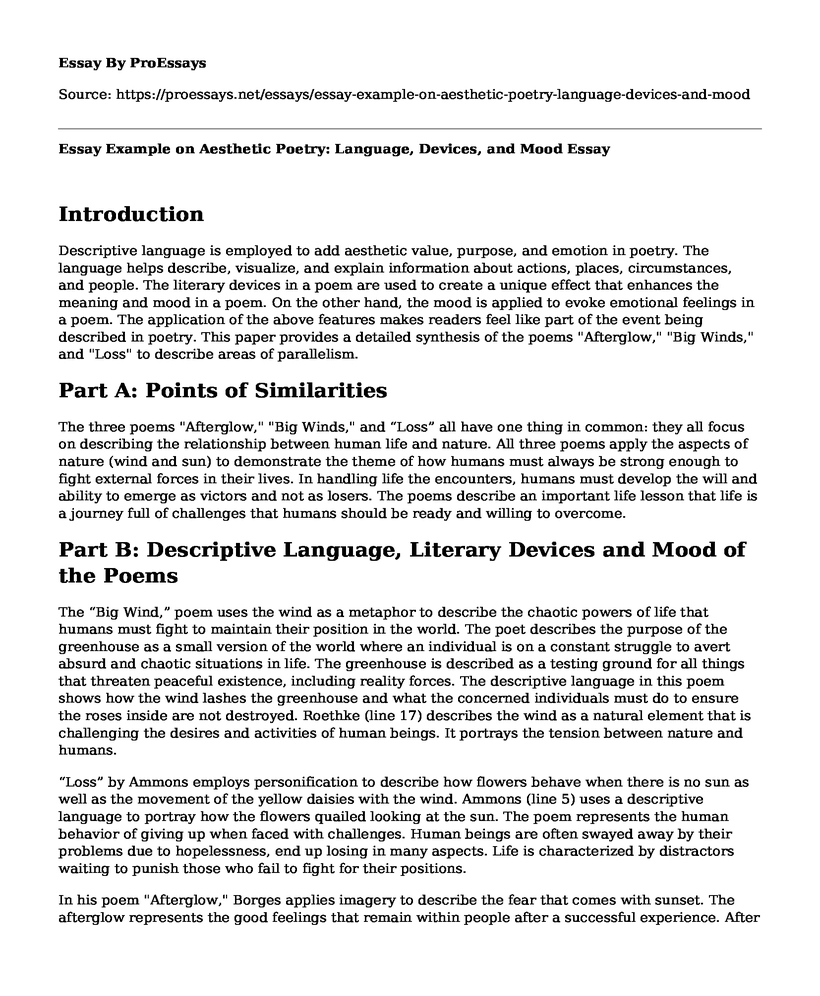Introduction
Descriptive language is employed to add aesthetic value, purpose, and emotion in poetry. The language helps describe, visualize, and explain information about actions, places, circumstances, and people. The literary devices in a poem are used to create a unique effect that enhances the meaning and mood in a poem. On the other hand, the mood is applied to evoke emotional feelings in a poem. The application of the above features makes readers feel like part of the event being described in poetry. This paper provides a detailed synthesis of the poems "Afterglow," "Big Winds," and "Loss" to describe areas of parallelism.
Part A: Points of Similarities
The three poems "Afterglow," "Big Winds," and “Loss” all have one thing in common: they all focus on describing the relationship between human life and nature. All three poems apply the aspects of nature (wind and sun) to demonstrate the theme of how humans must always be strong enough to fight external forces in their lives. In handling life the encounters, humans must develop the will and ability to emerge as victors and not as losers. The poems describe an important life lesson that life is a journey full of challenges that humans should be ready and willing to overcome.
Part B: Descriptive Language, Literary Devices and Mood of the Poems
The “Big Wind,” poem uses the wind as a metaphor to describe the chaotic powers of life that humans must fight to maintain their position in the world. The poet describes the purpose of the greenhouse as a small version of the world where an individual is on a constant struggle to avert absurd and chaotic situations in life. The greenhouse is described as a testing ground for all things that threaten peaceful existence, including reality forces. The descriptive language in this poem shows how the wind lashes the greenhouse and what the concerned individuals must do to ensure the roses inside are not destroyed. Roethke (line 17) describes the wind as a natural element that is challenging the desires and activities of human beings. It portrays the tension between nature and humans.
“Loss” by Ammons employs personification to describe how flowers behave when there is no sun as well as the movement of the yellow daisies with the wind. Ammons (line 5) uses a descriptive language to portray how the flowers quailed looking at the sun. The poem represents the human behavior of giving up when faced with challenges. Human beings are often swayed away by their problems due to hopelessness, end up losing in many aspects. Life is characterized by distractors waiting to punish those who fail to fight for their positions.
In his poem "Afterglow," Borges applies imagery to describe the fear that comes with sunset. The afterglow represents the good feelings that remain within people after a successful experience. After the sunset, darkness dominates and makes people fearful before they can realize there is nothing there. Descriptive language tells of the moment people grasp that they are just living in a dream, which like the sunset, can be shattered (line 12). The sunset represents people’s dreams, which could vanish into the darkness, thus causing a lot of stress. In real life, people might expect their lives to be beautiful, but the path may not always be bright due to constant challenges
The three poems have a motivational mood that aims at helping the readers to work their way towards reaching their dreams and avoiding distractors. The poems inspire the readers to focus on achieving victory by overcoming the challenges.
Part C: Poems Parallelism
The three poems demonstrate that it is only through absolute force of personal determination that humans can overcome life challenges. The poems reflect the existence of external forces that continually emerge in people’s lives to test their ability to persevere and face challenges.
Works Cited
Ammons, A. R. "Loss."" Words for the Year, 16 Nov. 2017, wordsfortheyear.com/2017/11/16/loss-by-a-r-ammons/.
Borges., Jorge L. "Afterglow – English Version." 25 Aug. 2013, thepassengertimes.com/2012/01/31/jorge-luis-borges-afterglow-english-version/.
Roethke, Theodore. "Big Wind." PoemHunter.com, www.poemhunter.com/poem/big-wind/
Cite this page
Essay Example on Aesthetic Poetry: Language, Devices, and Mood. (2023, Aug 29). Retrieved from https://proessays.net/essays/essay-example-on-aesthetic-poetry-language-devices-and-mood
If you are the original author of this essay and no longer wish to have it published on the ProEssays website, please click below to request its removal:
- Intertextuality in J. Fowles' "The French Lieutenant's Woman"
- Poetry Analysis Essay on Describe Yourself in Three Words or Less
- Response Essay Sample on A Doll`s House
- Literary Analysis Essay on "Sympathy" by Paul Laurence Dunbar
- Gender Issues in "A Raisin in the Sun" Essay Example
- Essay Example on Goethe's Ideal in Real-Life: Applying to Schools
- Paper Example on Exploring the Echoes of Emerson and Thoreau in Whitman







